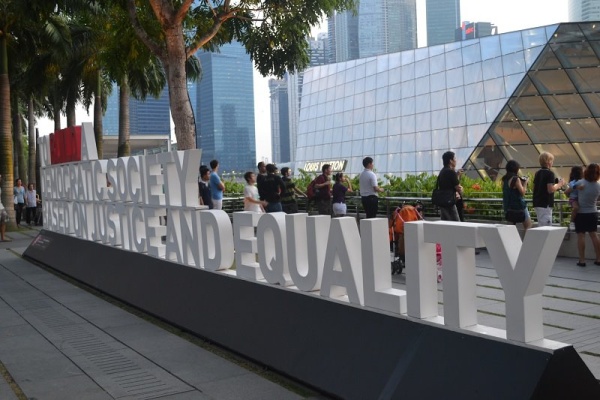
By Soon Sze Meng
Our Singapore Conversation asks ourselves where we should be heading. It is as important to ask ourselves first what makes Singapore home and identify ourselves as being Singaporean.
To me, it is about our shared experiences and values. Our shared experiences are the common spaces in this small island where we have grown up and the myriad of local food we had together as family and friends.
I believe our shared values are encapsulated in our national pledge; recited by hundreds of thousands of Singaporeans in schools for over four decades. Our national pledge shows us not where we are fully now, but what we hope to become.
We believe that no one should be discriminated against based on their skin color, beliefs and their language. National institutions such as our public schools, public housing estates and national service ensure mixed racial interactions. Unlike private housing, public housing has ethnic quota to ensure that Malay weddings and Chinese funerals take their turns at our void decks.
However, there is still discrimination on ethnicity and religion. Unjust racist remarks have been made behind anonymity online in increasing frequency. Many of these perpetuators have been brought to the courts, such as the recent arrest of two 17-year-olds for allegedly posting racist remarks online. We who find these comments offensive have the obligation to speak up.
We believe that no one should be left behind just because he or she was born into a poor or dysfunctional family. The equality in our pledge does not mean equal outcomes. It does mean that everyone should have an equal opportunity to achieve their Singapore dream.
However, increasing income inequality means well-to-do families can provide more tuition, enrichment classes and overseas trips for their children. A recent 2012 research survey, “Private Tuition in Singapore”, by Blackbox, shows that 40% of respondents enrolled their children in tuition. Most worryingly, “Only 4% in the lowest monthly household income bracket ($4k and below) have kids currently enrolled in tuition, indicating tuition may be less accessible for those without the means.”
Alumni and volunteers spaces in popular primary schools for these same families accentuate these advantages. In 2012, at least half of the Primary 1 places in 30 popular primary schools have already been taken up at Phase 2A, reserved for children of alumnus. In 2010, former PM Lee Kuan Yew remarked after a primary school visit:
“At the primary stage, the choice is not chosen in a uniformed way. If you have a brother there, or a sister there, if your father or mother is an … alumnus, and so on – so it’s not meritocratic. It’s based on the social class of the parents, for they went into the better schools.” However, Mr Lee further pointed out that ‘at Primary 6, there should be a sorting out, and those who miss going to the good schools should get into the better schools, better secondary schools.”
Unfortunately, this inequality of opportunity starts much earlier. It is a sober reminder when the Lien Foundation report in 2012 on early childhood education places Singapore 29th out of 45 countries. Our early childhood education system is 100% privately run, which penalizes families without sufficient resources.
Public policy such as the COE system favors the well-to-do who own cars allowing them to achieve more ease and more in life. More worrying, as more Singaporeans live in different social circles separated by their income and educational levels, the network that help one to achieve more in life has significantly diverged.
We believe that no one should be above the rule of law. Our legal system and police force have judiciously enforced the rule of law on all, evident by the recent arrest and prosecution of alleged corruption cases by senior public officials. Bringing the famous, rich and well-connected to open courts for their alleged offences reflects our strong sense of justice. Minister for Law, K Shanmugam stated in Parliament on 14 May 2012, “Justice must not only be done, it must be seen to be done; and there need to be good grounds to make exceptions to this rule.” However, even as some cases are sensationalized by the media, let us remind each other that everyone is innocent until proven guilty.
We believe in a democratic society where there must be open and fair elections where all are subject to the rule of law. The legitimacy of our political leaders to govern rests on a one-man-one vote general election process. We should continue to develop a healthy political culture and level playing ground to ensure our march towards a more democratic society, which are essential to ensure non-discrimination, equality of opportunity, and justice.
Mr S. Rajaratnam penned the pithy 38-word national pledge further polished by Mr Lee Kuan Yew 46 years ago, when Singapore just turned one. It is still relevant today, if not more so. Only 3.3 million people can identify themselves as Singaporeans. There is a mutual obligation to ensure that our national institutions and public policies reinforce our shared values, especially as our society experiences growing income inequality and a smaller proportion of citizens.
Therefore, we, as Singapore citizens, must work together to become what we pledge to be.
——————
The writer is a graduate of public policy and business administration and works in a MNC in Singapore. He is a Singapore citizen.
An edited version of this article was published on Today here.
